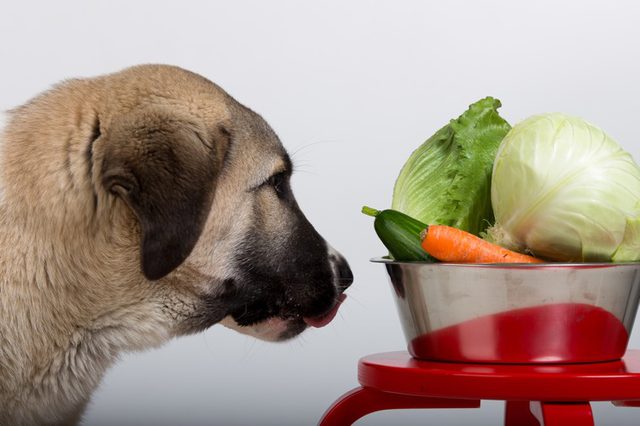Can my dog eat Japanese pumpkin or kabocha squash? 
Does your dog like to eat the food you eat? He may want your food at mealtimes, but he may want your snacks, too! Dogs are omnivores, meaning they love to eat meat, fruit, and vegetables. One food that many pet parents wonder if their dogs can eat is Japanese pumpkin, also called kabocha squash.
Connect with a verified veterinarian in minutes. Licensed vets are available 24/7 to answer your questions. No need to worry about your furry family member.
We’ll answer the question about whether your dog can safely eat Japanese squash or not!
What is Japanese Pumpkin?
Japanese pumpkin, also known as kabocha squash, is a winter squash first cultivated in Japan. It’s now become popular in the U.S. and other parts of the world and is prized for its sweet, buttery flavor. Kabocha squash looks like a small pumpkin, with green knobby outer skin.
You can cook this squash in a variety of ways, including as a side dish, soup, etc. You can even use it as an alternative to pumpkin, butternut squash or acorn squash in certain recipes. Japanese pumpkin is very healthy and includes Vitamins A & C, iron, copper, magnesium, B Vitamins and more.

Review symptoms, medications & behavior to keep your pets healthy with a Vet Online in just minutes.
Ask a Vet Live NowCan my Dog Eat Japanese Pumpkin?
Yes, your pup can enjoy Japanese pumpkin along with you! Can my puppy eat Japanese pumpkin? Yes, your puppy can also enjoy some Japanese pumpkin. However, before feeding this squash to your dog or puppy, there are some things to keep in mind.
While the skin of some squashes (summer squash) is edible, the skin of winter squashes is not, because it’s usually thicker and harder. Avoid feeding this part to your fur baby. It’s best to first cook the squash, to make it easier for your dog to digest. You can feed him only a small amount mixed in with his regular dog food (homemade or commercial).
Potential Issues for Dogs Eating Kabocha Squash
While most dogs can safely eat kabocha squash (Japanese pumpkin), there are some indications you need to watch for in case the squash doesn’t settle well with your dog:
Digestive Issues
Feed your dog small portions to begin with and watch him for any concerning reactions (such as diarrhea and vomiting).
Allergies
Some dogs may develop allergies to certain vegetables, including Japanese pumpkin. Other dogs may have intolerances to different foods, including this squash.
Signs of an allergic reaction in your dog can include:
- Itching
- Hives
- Vomiting
- Diarrhea
- Difficulty breathing
If your fur baby shows any of these symptoms, it’s best to call the vet. In rare instances, a dog may develop a life-threatening reaction called an anaphylactic reaction. This must be treated by a vet.
Watch the Portions
Kabocha squash can be healthy for dogs; however, it should never become the main part of your dog’s daily diet. Most of your dog’s nutrients should come from commercial dog food that contains real meat (such as chicken or turkey) listed as the first ingredient.
Ways to Serve Kabocha to Your Dog
You can serve small portions of Japanese pumpkin to your dog in these ways:
Boiled: boil the squash until it’s soft, then let it cool before giving it to your dog.
Steamed: cut the squash into small bite-sized pieces, but be sure to remove the skin and the seeds. Steam the squash until they are soft and easy to mash with a fork. Allow them to cool before serving to your canine companion.
Mashed: you can also mash boiled or steamed kabocha, then allow it to cool before serving it to your fur baby.
Kabocha squash treats: you can also make homemade treats with Japanese pumpkin. All you need to do is mix the mashed squash with whole wheat flour and water, until a dough forms. Shape the dough into small treats and bake until they are crisp.
What happens if my dog eats too much Japanese pumpkin? If he eats too much, he could develop tummy and digestive problems, including diarrhea.
Connect with a verified veterinarian in minutes. Licensed vets are available 24/7 to answer your questions. No need to worry about your furry family member.

Julie
Julie is a graduate of the University of North Carolina, Wilmington, where she studied Animal science. Though contrary to the opinion of her parents she was meant to study pharmacy, but she was in love with animals especially cats. Julie currently works in an animal research institute (NGO) in California and loves spending quality time with her little cat. She has the passion for making research about animals, how they survive, their way of life among others and publishes it. Julie is also happily married with two kids.
Review symptoms, medications & behavior to keep your pets healthy with a Vet Online in just minutes.
Ask a Vet Live Now

